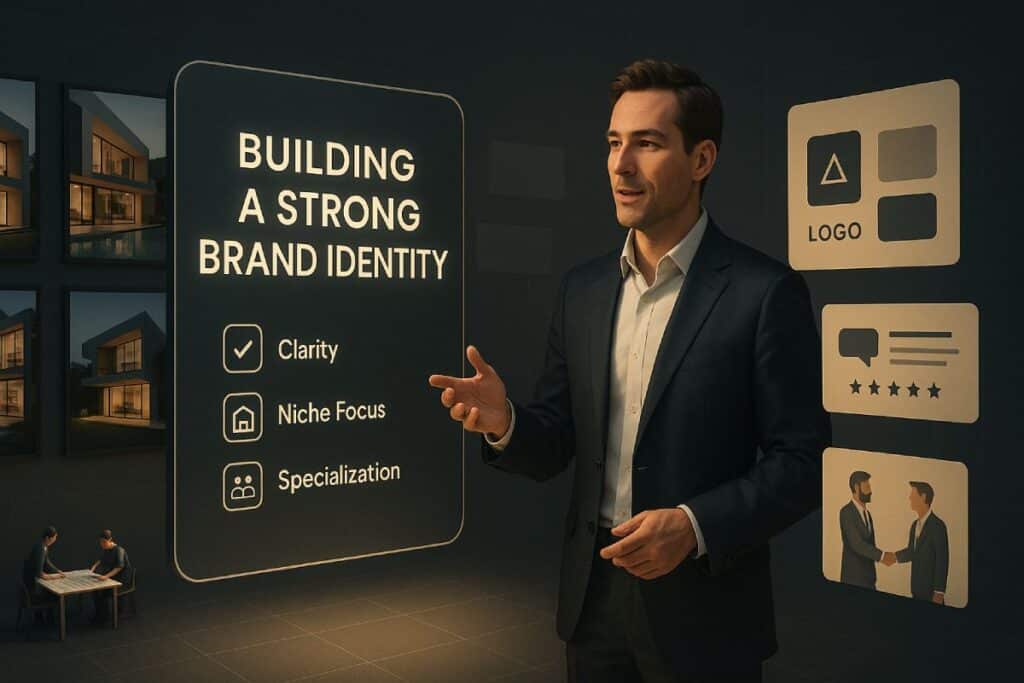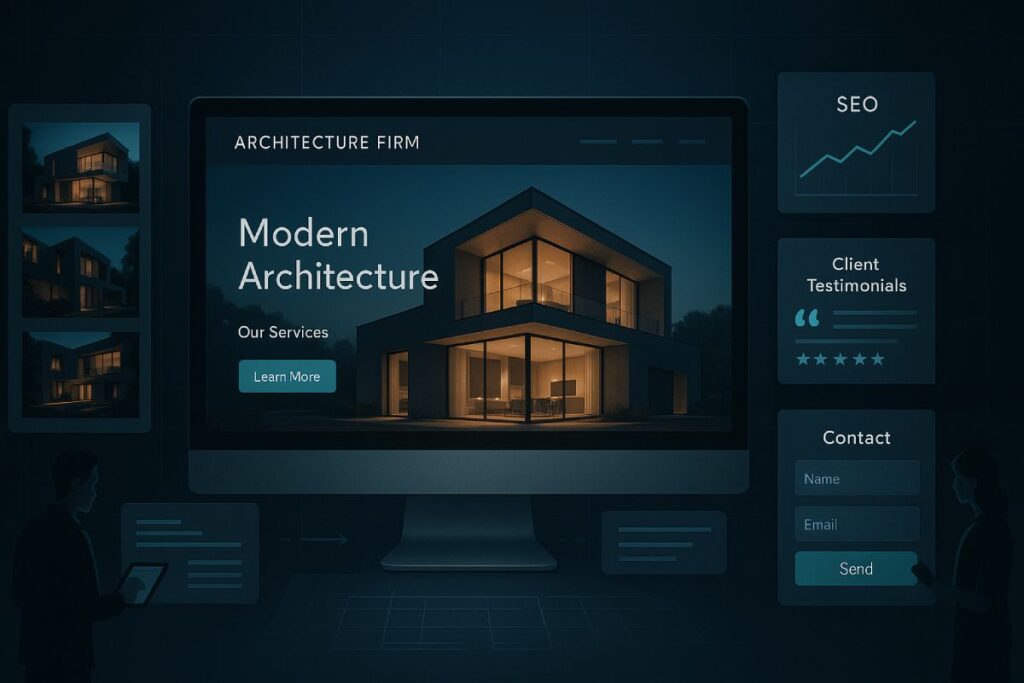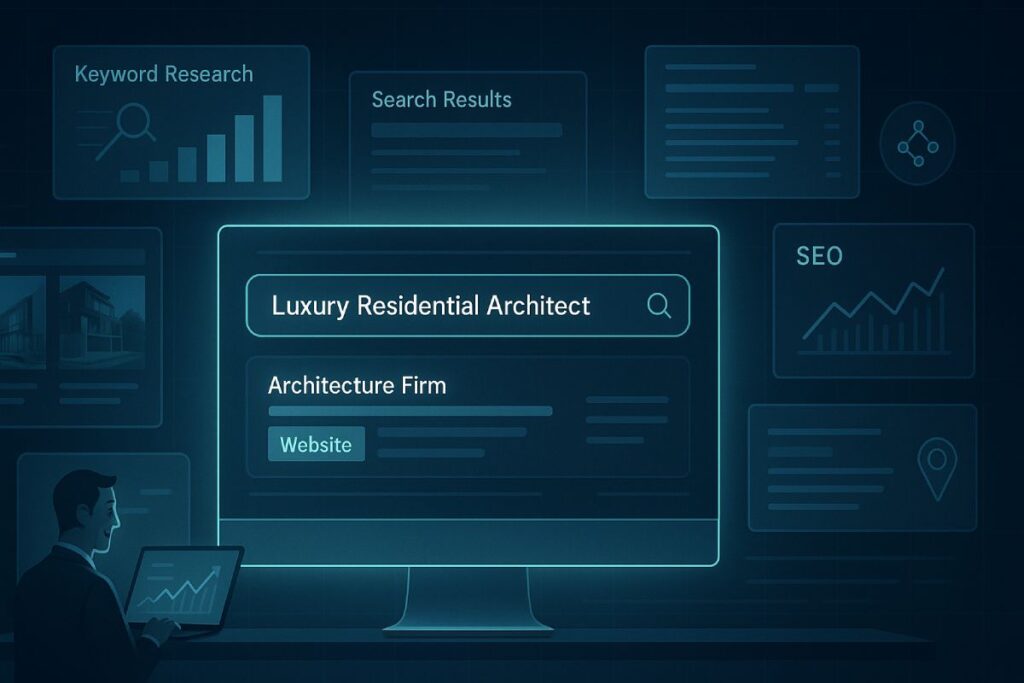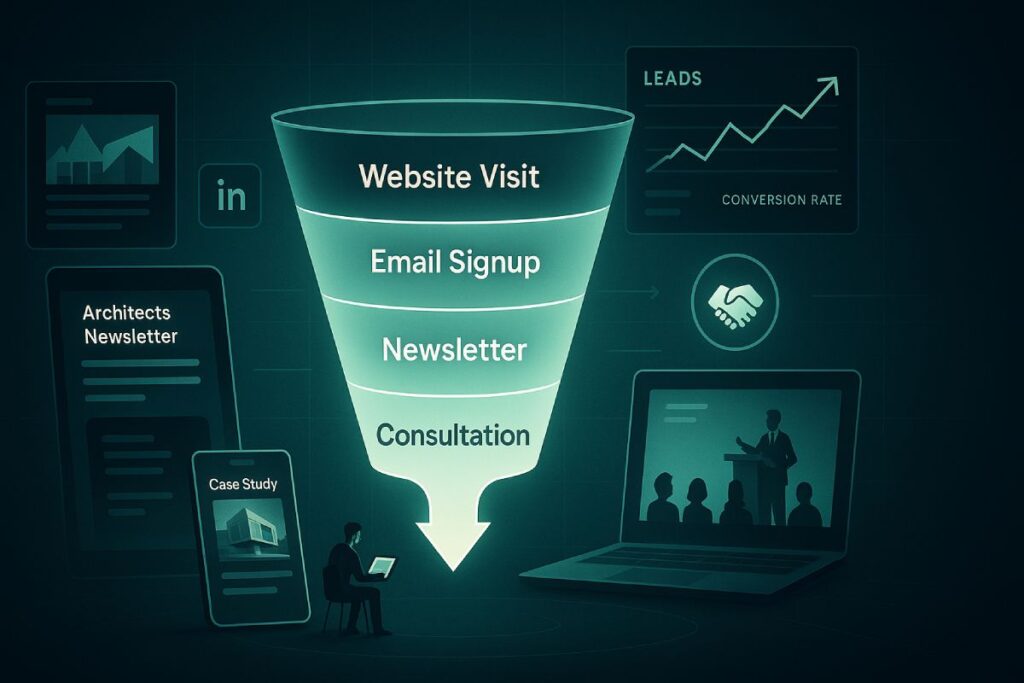Most architects share the same frustrations: projects come irregularly, fees are constantly undercut, and new work depends almost entirely on referrals.
In today’s oversaturated market, relying on word of mouth or hoping that “good design sells itself” is no longer enough. Even the most talented firms risk being overlooked if they don’t actively market their services.
This guide will show you how to build a consistent flow of high-paying clients by treating marketing as a core part of running your practice – not just an optional add-on. You’ll learn how to define a strong brand identity, create a website that attracts inquiries, use SEO to gain visibility, and implement lead generation strategies that keep your pipeline steady.
1. Understanding Marketing for Architects
Architecture as Both Art and Business
Architecture has always been celebrated as an art form – a way of shaping space, culture, and experience. But behind every striking design lies a reality many firms overlook: architecture is also a business.
Like any business, it depends on visibility, positioning, and a steady flow of clients. A studio that treats marketing as optional often finds itself in the same trap – brilliant projects on the boards, but inconsistent revenue and little control over who walks through the door.

Common Mistakes Firms Make
Many architects start with passion, but get stuck in habits that limit growth:
- Being a “jack of all trades.” Firms try to take on every project – from kitchens to office towers. Instead of signaling versatility, this often communicates a lack of focus. Clients looking for a premium service usually prefer a specialist over a generalist.
- Relying only on referrals. Referrals are valuable, but they’re unpredictable. A referral-driven model makes it hard to plan cash flow or scale, especially in competitive or high-end markets.
- Assuming good work markets itself. While quality is essential, clients can’t hire you if they don’t know you exist or can’t see why your work fits their needs better than others.
Consider a mid-size firm in Lisbon that used to describe itself as “multidisciplinary.” They struggled to raise fees and often lost bids to cheaper competitors.
After narrowing their focus to boutique hospitality projects – and communicating that niche through their brand and website – they began attracting international clients willing to pay for their expertise.
Why a Marketing Strategy Matters
A deliberate marketing strategy transforms how potential clients see your practice. It helps you:
- Build authority by being known as the go-to firm in a niche.
- Win high-value projects by showing expertise that justifies premium fees.
- Enhance predictability with a steady pipeline, rather than sporadic referrals.
- Enhance your market positioning by shifting conversations from price to value.
This is the foundation of everything that follows. Before diving into tactics like SEO or lead generation, the first step is building a clear brand identity. If you want guidance on clarifying your niche and communicating it effectively, explore our Branding & Positioning Services.
2. Building a Strong Brand Identity
Defining Your Value Proposition
Every architecture firm has talent, but not every firm communicates why a client should choose them. That answer – your value proposition – is the core of your brand. It should explain, in simple terms, what you do, who you do it for, and why you’re the best choice.
Without it, your marketing risks sounding generic, blending into the background of countless firms claiming to “design everything for everyone“.
The Power of Niche Specialization
High-value clients rarely seek out generalists. They want architects with proven expertise in their specific type of project. For example:
- A family commissioning a luxury residence wants to see that you’ve delivered bespoke homes before.
- A developer building sustainable housing wants confidence you can navigate energy codes and green certifications.
- A corporate client wants reassurance that you understand workplace needs and complex stakeholder management.
Positioning your firm as a specialist in a particular niche doesn’t reduce opportunities – it amplifies them.
A Madrid-based studio once struggled to stand out while marketing itself as a “full-service architecture firm.” After repositioning as experts in boutique hotels, they not only doubled their average project size but also attracted press coverage that reinforced their authority.

Storytelling Builds Credibility
Facts and credentials matter, but what truly resonates with clients is storytelling. Sharing the story behind a project – the challenges you solved, the collaboration process, the impact on the client’s life or business – builds trust and emotional connection.
For example, instead of only listing “luxury residence, 400 m²,” describe how your design balanced privacy with expansive views, creating a home that became a retreat for the family.
These stories can be showcased in case studies on your website, client testimonials, or even short videos that bring your process to life.
Branding Beyond Words
Visuals are as much a part of your brand as your narrative. A professional logo, cohesive color palette, and clear design language across your website, proposals, and presentations signal that your firm operates at a premium level.
Just as important is your tone of voice – whether it’s approachable, innovative, or authoritative, it should be consistent across all touchpoints.
Finally, your portfolio presentation is often the deciding factor for clients. Curate it carefully: highlight the projects that align with your positioning, present them with high-quality visuals, and frame each one with a story that reflects your value proposition.
Strong branding doesn’t happen by accident. It’s the result of deliberate strategy and design. If you’d like expert guidance in shaping your value proposition and positioning your firm to attract the right clients, explore our Branding & Positioning Services.
3. Website & Digital Presence
Your Website as the Firm’s Digital Headquarters
For today’s clients, your website is more than a business card – it’s your digital headquarters. It’s often the first impression a potential client gets, and within seconds, they decide whether your firm feels trustworthy, relevant, and worth contacting.
An outdated or poorly structured site can quietly cost you high-value projects, even if your work is outstanding.
Think of your website as the central hub that connects every aspect of your marketing: SEO, social media, email campaigns, and referrals all funnel back to it. If it’s designed strategically, it doesn’t just inform – it converts visitors into inquiries.
Essential Elements Every Architecture Firm Website Needs
A professional, client-focused site should include:
- Portfolio Showcase – High-quality images and case studies that highlight your best projects. Each project should include a short story about the design challenges and the results, not just pretty photos.
- Client Testimonials – Genuine voices from past clients build trust and reduce hesitation. Video testimonials can be especially powerful.
- Clear Service Descriptions – Instead of vague “we do everything” claims, outline the services that align with your positioning (residential, sustainable design, commercial). Show how these services solve client problems.
- Strong Calls-to-Action – Buttons like “Schedule a Consultation” or “Request a Proposal” should appear naturally across your pages. Make it easy for clients to take the next step.

Structuring Your Website for SEO
A good website doesn’t just look polished – it’s built for visibility. An SEO-ready structure ensures that people searching for architects in your niche can actually find you. Key components include:
- Dedicated service pages targeting keywords like “luxury residential architect” or “sustainable office design.”
- A regularly updated blog to demonstrate expertise, attract organic traffic, and answer client questions.
- Optimized contact forms that are simple, mobile-friendly, and strategically placed throughout the site.
When these elements work together, your website becomes a long-term lead-generation tool instead of a static brochure.
Enhancing Engagement with Modern Media
Clients increasingly expect immersive experiences. Incorporating video walkthroughs, 3D renders, or even VR tours can set your firm apart.
For example, a studio in London added a 60-second project video on its homepage; inquiries from overseas clients rose significantly because prospects could “experience” the firm’s work before even speaking to them.
These tools don’t just impress – they communicate your design process in a way that words and photos alone cannot.
Building a Website That Wins Clients
An effective website isn’t just beautiful; it’s strategic, client-focused, and designed to generate inquiries. If your current site feels more like an online portfolio than a true business tool, it may be time for a redesign.
Explore our Website Design Services to see how we help architecture firms turn their digital presence into a consistent source of high-quality leads.
4. SEO for Architecture Firms
Why SEO Is the Foundation of Client Attraction
Search Engine Optimization (SEO) is one of the most powerful tools for architects who want a steady flow of qualified clients. Unlike ads, which stop generating results the moment you pause them, SEO builds long-term visibility. A well-optimized website ensures that when potential clients search for an architect, your firm appears at the top of the results.
Consider how most people begin their journey: they type queries into Google like “architect near me,” “luxury home architect,” or “office renovation design.” If your firm doesn’t appear for these searches, you’re missing out on clients who are actively looking for services right now.
Key SEO Elements for Architects
To compete effectively online, your website needs to be optimized across several dimensions:
- Keyword Research – Identify what your ideal clients are typing into search engines. A boutique residential architect may focus on “custom home architect in [city],” while a commercial firm may target “office renovation design company.”
- On-Page Optimization – Align each page of your website with those keywords. This includes titles, headings, meta descriptions, and even how images are labeled.
- Link Building – Search engines treat links from other reputable sites as “votes of confidence.” Getting featured in online magazines, directories, or local business networks can significantly boost your visibility.
- Local SEO & Google Business Profile – Many clients start with local searches. A complete and optimized Google Business Profile – with images, reviews, and updated information – ensures you show up in Google Maps and “near me” searches.

Case Study: The Power of SEO in Practice
A mid-sized architecture studio in Barcelona once relied almost exclusively on referrals. Their website looked professional but wasn’t optimized for search. After restructuring the site with targeted service pages (“sustainable residential architecture Barcelona”), updating their Google Business profile, and publishing monthly blog posts answering client questions, they saw a dramatic change:
- Website traffic tripled in 9 months.
- Inquiries increased by 65%.
- They signed two international projects that found them entirely through Google searches.
This wasn’t an overnight result – but within a year, SEO had become their primary source of new business.
Turning Search into Clients
For architecture firms, SEO is more than a technical exercise. It’s about ensuring that your expertise is visible to the clients who are actively searching for it. By investing in SEO, you’re creating a sustainable growth engine that keeps delivering opportunities long after the initial work is done.
If you’d like to transform your website into a client-attracting machine, explore our SEO Services and see how we help firms like yours climb the rankings and win high-value projects.
5. Lead Generation Strategies
Why Lead Generation Matters
Even the strongest brand and best-designed website won’t drive growth without a system for capturing and nurturing leads.
Lead generation ensures that potential clients don’t just admire your work – they take the next step toward hiring your firm. Below are strategies that work especially well for architecture practices.
Email List Building & Newsletters
An email list is one of the most reliable ways to stay connected with prospects. Offer valuable resources – such as a short guide to design trends or a case study on cost-saving strategies – in exchange for their email.
Once subscribed, send newsletters showcasing recent projects, behind-the-scenes insights, or client success stories. This keeps your firm top-of-mind until the prospect is ready to move forward.
Hosting Events & Webinars
Events position you as an authority while giving prospects a chance to engage directly with your expertise. For example, a studio specializing in sustainable homes might host a webinar on “How to Design a Net-Zero House.”
A small firm in Milan grew its pipeline significantly by running quarterly online sessions for developers, offering practical advice and creating networking opportunities that led to new contracts.
Strategic Partnerships
Collaborating with developers, real estate agents, or interior designers expands your reach. These partners already work with clients who may need architectural services, making referrals natural. One boutique firm partnered with a luxury real estate agency; within six months, they closed two residential projects sourced entirely through that relationship.

Using LinkedIn to Build Authority
LinkedIn is one of the most underused tools for architects. Consistently posting thought leadership content, sharing case studies, and engaging with developers or corporate decision-makers can build credibility with the exact audience you want to reach.
It’s especially effective for firms targeting B2B projects like office design or commercial developments.
Paid Campaigns for Targeted Reach
Paid advertising can amplify your efforts quickly. Google Ads help you appear at the top of searches for terms like “office renovation architect London” while LinkedIn Ads allow you to target decision-makers by role, industry, or location.
When done strategically, these campaigns bring in qualified leads instead of broad, unfocused traffic.
Funnels & Automation
Not every visitor is ready to hire immediately – but with the right funnel, you can guide them through the process. For example, a blog post about “Top 5 Mistakes in Office Renovations” could lead to a downloadable guide, which captures the reader’s email.
From there, an automated email sequence nurtures the lead with helpful content before inviting them to book a consultation.
Building Your Lead System
The goal isn’t just more leads, but better leads – clients aligned with your niche, ready to invest in your expertise.
If you want to build a system that consistently fills your pipeline, explore our Lead Generation Services and see how we help architecture firms turn interest into signed projects.
6. Offline & Relationship Marketing
Public Speaking & Networking
Face-to-face opportunities remain powerful for architects. Speaking at industry events, design schools, or community panels positions your firm as a thought leader while allowing potential clients to connect with you on a personal level.
Networking through chambers of commerce or local business associations also opens doors to decision-makers who may never find you online.
Professional Associations
Joining professional organizations provides credibility and exposure. Membership in architecture councils, green building associations, or real estate groups not only enhances your reputation but also gives access to exclusive networking and publishing opportunities.
These associations often maintain directories or sponsor events where your participation can directly lead to projects.

Getting Published
Publication in respected outlets – from design magazines to business trade journals – builds authority that few competitors can match.
A mid-size firm in Berlin once submitted a case study to a regional real estate magazine; within weeks, they received inquiries from two corporate clients who cited the article as their introduction to the firm. In the digital age, these features can also be shared across your website and social channels, multiplying their impact.
Client Testimonials & Referral Systems
Nothing carries more weight than a satisfied client’s endorsement. Proactively request testimonials at the conclusion of a project and ask permission to highlight them on your website and proposals.
To go further, formalize a referral system – a small token of appreciation or exclusive design review session for clients who recommend you can turn satisfied customers into long-term advocates.
How Offline Fuels Online Visibility
Offline strategies strengthen your digital presence when integrated properly. A speaking engagement becomes a video highlight for your website, a published article becomes a blog post link, and a client testimonial becomes a social media feature.
By repurposing offline credibility into online content, you create a cycle where each channel reinforces the other.
For architects, trust is built on both relationships and reputation. Offline marketing creates the human connections, while online platforms amplify them to a wider audience.
7. Tracking & Measuring Results
Why Tracking Matters
A marketing strategy only works if you can measure its impact. Too often, architecture firms invest in a website redesign or occasional campaigns without monitoring whether those efforts generate new business.
Tracking results transforms marketing from guesswork into a system that can be improved and scaled.
Key Metrics for Architecture Firms
Focus on a handful of key performance indicators (KPIs):
- Website Traffic – Are more potential clients discovering your firm online?
- Inquiries – How many project requests or consultation forms are being submitted each month?
- Email Subscribers – Is your audience growing, giving you more opportunities to nurture leads?
- Proposal Conversion Rate – Out of the proposals you send, how many turn into signed projects?
These numbers provide a clear picture of what’s working and where adjustments are needed.
![]()
Tools That Simplify Tracking
- Google Analytics for monitoring website visitors, traffic sources, and user behavior.
- CRM Systems (like HubSpot or Zoho) for tracking leads through your pipeline and identifying which marketing channels deliver the best clients.
- Email Marketing Dashboards for open rates, click-through rates, and subscriber growth.
With these tools, even small firms can measure performance without needing a dedicated marketing department.
Think ROI, Not Cost
The most successful firms treat marketing as an investment. When you track your numbers, you can see the return: whether it’s a steady rise in inquiries, more high-value projects, or an improved win rate on proposals.
If you want clarity on where your marketing stands – and guidance on how to improve it – schedule a consultation with our team. Together, we’ll help you build a measurable system for growth.
The difference between a thriving architecture firm and one that struggles isn’t talent alone – it’s marketing. Firms that treat marketing as a core part of their business build authority, attract clients who value their expertise, and command higher fees. Those that ignore it often remain stuck in cycles of inconsistent work and price-driven competition.
The good news is that you don’t have to manage this alone. At UNCOMMON Architects, we specialize in helping architecture firms simplify the marketing process and turn it into a predictable engine for growth. With the right strategy in place, you can spend less time worrying about where the next project will come from and more time focusing on the work you love.
Ready to attract high-paying clients? Let’s talk. Explore our SEO Services, Lead Generation, Website Design, and Branding & Positioning to start building your growth engine today.

